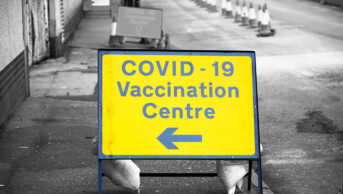
Shutterstock.com
Open access article
The Royal Pharmaceutical Society has made this article free to access in order to help healthcare professionals stay informed about an issue of national importance.
To learn more about coronavirus, please visit: https://www.rpharms.com/coronavirus
A ‘normal’ immune response to COVID-19 vaccination could interfere with routine clozapine monitoring, mental health pharmacists have warned.
The warning comes after reports that a small number of people have had their clozapine treatment discontinued because of a reduction in white blood cells following infection with COVID-19.
Currently, national guidance mandates that patients with a ‘red’ or ‘amber’ result — indicating that a patient’s white blood cell or neutrophil count is lower than normal — should have extra monitoring or have their clozapine treatment stopped altogether.
However, studies indicate that reductions in white blood cell count are likely to be a result of the COVID-19 infection and not clozapine, and experts say that white blood cell counts should recover quickly without needing to stop the medication.
“I know people have been stopped [following COVID-19 infection] and suffered dramatic relapse,” said David Taylor, director of pharmacy and pathology at the Maudsley Hospital in London. “The manufacturers are tied to the licence for the drug — they don’t really have any discretion.
“The white cells seem to recover quickly so there should be no need for a prolonged break in treatment.”
The Pharmaceutical Journal has learnt that some pharmacists have similar concerns about clozapine being stopped following COVID-19 vaccination, particularly as some clozapine monitoring services may not yet have modified their procedures to allow for possible transient falls in white blood cell counts or neutrophils relating to COVID-19.
Nicola Greenhalgh, lead pharmacist of mental health services at North East London NHS Foundation Trust, said: “There is evidence from studies that the normal immune response to vaccines leads to a reduction in neutrophils in a way which can then interfere with routine clozapine monitoring.
“Early in the year, when the vaccine rollout was coming out, we sent guidance to our teams to encourage patients to try and have their vaccines immediately after a clozapine blood test to try and avoid taking the clozapine full blood count when neutrophils are likely to be affected, and therefore reduce the chance of an inadvertently low white blood count from the vaccine,” she explained.
“That seems to be working for us as I haven’t had any specific patients I am aware of here who have had to stop clozapine because of the vaccine and as the clozapine lead I receive communication of all patients who have red or amber results.”
Evidence gathered by members of the College of Mental Health Pharmacy (CMHP), and seen by The Pharmaceutical Journal, highlighted a case of a patient who had their clozapine stopped in 2020 owing to neutropenia when physically unwell with COVID-19 and who quickly became mentally unwell. The patient refused blood tests and oral clozapine, before ending up on a depot in a psychiatric intensive care unit until April 2021. The patient is now in the process of being re-titrated onto clozapine.
Ciara Ni Dhubhlaing, president of the CMHP, said that although cases of patients having their clozapine stopped following a COVID-19-related ‘red result’ had been “relatively infrequent”, it had been “occurring nationally”.
She added: “The indication for clozapine is treatment-resistant schizophrenia; there is often no suitable alternative. Any treatment break or discontinuation is therefore likely to have severe consequences for the patient’s mental health.”
Greenhalgh said that her team also asked for unvaccinated patients to take a COVID-19 test in the event that they have an unexpected red or amber result, and for patients with symptoms of infection to have a full blood count to “avoid complacency” and ensure serious adverse effects are not missed.
There are three monitoring services for the three brands of clozapine: the Clozaril Patient Monitoring Service (CPMS), the Denzapine Monitoring Service and the Zaponex Treatment Access System (ZTAS).
A spokesperson for ZTAS confirmed that ZTAS did consider a blood dyscrasia (leukopenia and/or neutropenia) concurrent with a COVID-19 infection as an alternative medical explanation for those blood dyscrasias, especially in patients who had until then normal blood results.
“These patients can continue or restart clozapine within licence,” they added.
In relation to CPMS, a spokesperson for the global healthcare company, Viatris, confirmed that they were “fully compliant” with the requirements set by the Medicines and Healthcare Products Regulatory Agency for providing a clozapine patient monitoring service and were in line with the respective product licence.
- This article was amended on 2 August 2021 to correct an error to the acronym CMHP and to clarify that a patient was in a psychiatric intensive care unit, not a paediatric intensive care unit as previously stated.
Box: What should I do if a clozapine patient has a ‘red result’ in the context of COVID-19?
Siobhan Gee, principal pharmacist in liaison psychiatry at South London and Maudsley NHS Foundation Trust (SLaM), says SLaM guidance instructs prescribers to continue clozapine in patients who present with low neutrophils, in the context of COVID-19 infection, providing the neutrophils remain above 1 and the patient is deemed stable.
“Further, it is vital to realise that neutropenia in a clozapine patient may be indicative of asymptomatic COVID infection. They should isolate and test immediately. We have picked up multiple cases of COVID-19 through our clozapine clinics this way,” she added.
Gee added that it was “essential” that clozapine patients “for many reasons” have the COVID-19 vaccine.


